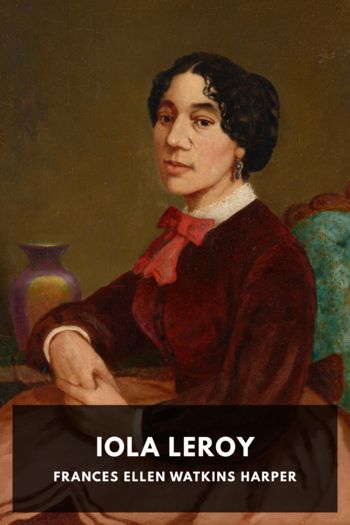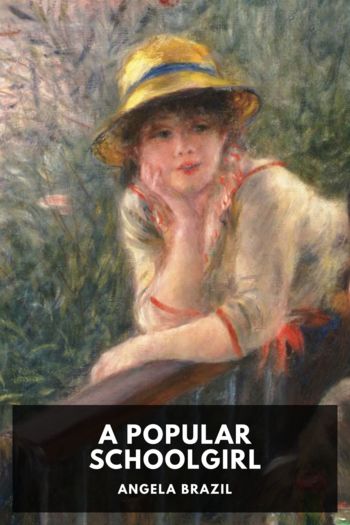Iola Leroy, Frances Ellen Watkins Harper [read aloud books .txt] 📗

- Author: Frances Ellen Watkins Harper
Book online «Iola Leroy, Frances Ellen Watkins Harper [read aloud books .txt] 📗». Author Frances Ellen Watkins Harper
Anxious as she was to ascertain if there was any relationship between Robert and her mother, she forebore to question him on the subject which lay so near her heart. But one day, when he was so far recovered as to be able to walk around, he met Iola on the hospital grounds, and said to her:—
“Miss Iola, you remind me so much of my mother and sister that I cannot help wondering if you are the daughter of my long-lost sister.”
“Do you think,” asked Iola, “if you saw the likeness of your sister you would recognize her?”
“I am afraid not. But there is one thing I can remember about her: she used to have a mole on her cheek, which mother used to tell her was her beauty spot.”
“Look at this,” said Iola, handing him a locket which contained her mother’s picture.
Robert grasped the locket eagerly, scanned the features attentively, then, handing it back, said: “I have only a faint remembrance of my sister’s features; but I never could recognize in that beautiful woman the dear little sister with whom I used to play. Oh, the cruelty of slavery! How it wrenched and tore us apart! Where is your mother now?”
“Oh, I cannot tell,” answered Iola. “I left her in Mississippi. My father was a wealthy Creole planter, who fell in love with my mother. She was his slave, but he educated her in the North, freed, and married her. My father was very careful to have the fact of our negro blood concealed from us. I had not the slightest suspicion of it. When he was dead the secret was revealed. His white relations set aside my father’s will, had his marriage declared invalid, and my mother and her children were remanded to slavery.” Iola shuddered as she pronounced the horrid word, and grew deadly pale; but, regaining her self-possession, continued: “Now, that freedom has come, I intend to search for my mother until I find her.”
“I do not wonder,” said Robert, “that we had this war. The nation had sinned enough to suffer.”
“Yes,” said Iola, “if national sins bring down national judgments, then the nation is only reaping what it sowed.”
“What are your plans for the future, or have you any?” asked Robert.
“I intend offering myself as a teacher in one of the schools which are being opened in different parts of the country,” replied Iola. “As soon as I am able I will begin my search for my dear mother. I will advertise for her in the papers, hunt for her in the churches, and use all the means in my power to get some tidings of her and my brother Harry. What a cruel thing it was to separate us!”
XVII Flames in the Schoolroom“Good morning,” said Dr. Gresham, approaching Robert and Iola. “How are you both? You have mended rapidly,” turning to Robert, “but then it was only a flesh wound. Your general health being good, and your blood in excellent condition, it was not hard for you to rally.”
“Where have you been, Doctor? I have a faint recollection of having seen you on the morning I was brought in from the field, but not since.”
“I have been on a furlough. I was running down through exhaustion and overwork, and I was compelled to go home for a few weeks’ rest. But now, as they are about to close the hospital, I shall be permanently relieved. I am glad that this cruel strife is over. It seemed as if I had lived through ages during these last few years. In the early part of the war I lost my arm by a stray shot, and my armless sleeve is one of the mementos of battle I shall carry with me through life. Miss Leroy,” he continued, turning respectfully to Iola, “would you permit me to ask you, as I would have someone ask my sister under the same circumstances, if you have matured any plans for the future, or if I can be of the least service to you? If so, I would be pleased to render you any service in my power.”
“My purpose,” replied Iola, “is to hunt for my mother, and to find her if she is alive. I am willing to go anywhere and do anything to find her. But I will need a standpoint from whence I can send out lines of inquiry. It must take time, in the disordered state of affairs, even to get a clue by which I may discover her whereabouts.”
“How would you like to teach?” asked the Doctor. “Schools are being opened all around us. Numbers of excellent and superior women are coming from the North to engage as teachers of the freed people. Would you be willing to take a school among these people? I think it will be uphill work. I believe it will take generations to get over the duncery of slavery. Some of these poor fellows who came into our camp did not know their right hands from their left, nor their ages, nor even the days of the month. It took me some time, in a number of cases, to understand their language. It saddened my heart to see such ignorance. One day I asked one a question, and he answered, ‘I no shum.’ ”
“What did he mean?” asked Iola.
“That he did not see it,” replied the doctor. “Of course, this does not apply to all of them. Some of them are wide-awake and sharp as steel traps. I think some of that class may be used in helping others.”
“I should be very glad to have an opportunity to teach,” said Iola. “I used to be a great favorite among the colored children on my father’s plantation.”
In a few days after this conversation the hospital was closed. The sick and convalescent were removed, and Iola obtained a position as





Comments (0)